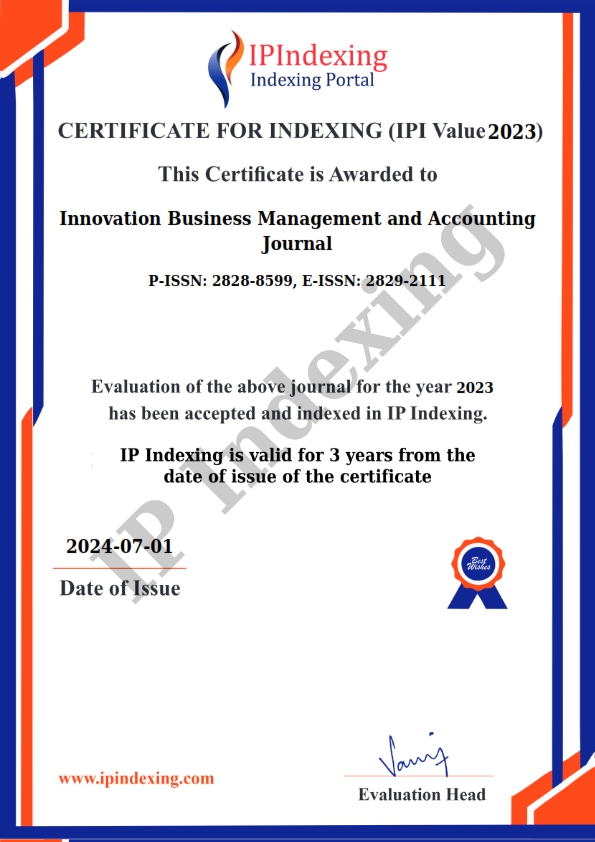The Role of Entrepreneurial Orientation and Entrepreneurial Leadership of SMEs in the City of Surakarta, Indonesia
DOI:
https://doi.org/10.56070/ibmaj.2024.009Keywords:
Business Performance, Entrepreneurial Leadership, Entrepreneurial Orientation, SMEsAbstract
This research analyzes entrepreneurial leadership and orientation's influence on business performance with competence as a mediating variable in Bakery SMEs in Surakarta City. The design of this research is explanatory causality research with a quantitative approach. The number of samples is determined using Slovin and simple random sampling of 189 respondents. The analytical tool used was SPSS description analysis. The study results showed entrepreneurial orientation, leadership, competence, and business performance perceptions. Entrepreneurial orientation in SMEs in Surakarta is empirically reflected by the courage to take risks, innovativeness, economy, and reactivity. The indicator of daring to take risks has the highest contribution value, especially regarding the courageous attitude of business actors to accept risks from the business they are running. Entrepreneurial Leadership in SMEs in Surakarta is empirically reflected by being brave enough to act, sociable, broad-minded, big-hearted, and self-confident. The self-confidence indicator has the highest contribution value, especially regarding the ability of bread SMEs in Surakarta to run a business that never gives up from the various obstacles they face. Knowledge, skills, self-concept, character, and motives empirically reflect competence.
Downloads
References
Andrews, D., A. Caldera Sánchez and Å. Johansson (2011). Towards a Better Understanding of the Informal Economy. OECD Economics Department Working Papers, 873, OECD Publishing, Paris, https://doi.org/10.1787/5kgb1mf88x28-en.
Barney, J. (1991). Firm resources and sustained competitive advantage. Journal of management, 17(1), 99-120. https://doi.org/10.1177/014920639101700108
Barney, J., Wright, M., & Ketchen Jr, D. J. (2001). The resource-based view of the firm: Ten years after 1991. Journal of management, 27(6), 625-641. https://doi.org/10.1177/014920630102700601
Bygrave, W. D., & Hofer, C. W. (1992). Theorizing about entrepreneurship. Entrepreneurship theory and Practice, 16(2), 13-22. https://doi.org/10.1177/104225879201600203
Caseiro, N., & Coelho, A. (2018). Business intelligence and competitiveness: the mediating role of entrepreneurial orientation. Competitiveness Review: An International Business Journal, 28(2), 213-226. https://doi.org/10.1108/CR-09-2016-0054
Cogliser, C. C., & Brigham, K. H. (2004). The intersection of leadership and entrepreneurship: Mutual lessons to be learned. The Leadership Quarterly, 15(6), 771-799. https://doi.org/10.1016/j.leaqua.2004.09.004
Darwis, G. (2017). Accelerated transformation of Indonesian SME’s: Embracing entrepreneurial orientation and innovation on achieving dynamic capability to increase competitiveness. borderless communities & nations with borders, 1089.
Dess, G. G., & Lumpkin, G. T. (2005). The role of entrepreneurial orientation in stimulating effective corporate entrepreneurship. Academy of Management Perspectives, 19(1), 147-156. https://doi.org/10.5465/ame.2005.15841975
Hakala, H. (2013). Entrepreneurial and learning orientation: effects on growth and profitability in the software sector. Baltic Journal of Management, 8(1), 102-118. https://doi.org/10.1108/17465261311291687
Ilesanmi, O. A. (2000). Entrepreneurial Development. 1st Ed. Ilorin. Kola Success Publications.
Kuratko, D. F. (2007). Entrepreneurial Leadership in the 21st Century Journal of Leadership and Organisational Studies, 13(4), 1-11.
Rastogi, P. N. (2003). The nature and role of IC: Rethinking the process of value creation and sustained enterprise growth. Journal of Intellectual Capital, 4(2), 227-248. https://doi.org/10.1108/14691930310472848
Rauch, A., Wiklund, J., Lumpkin, G. T., & Frese, M. (2009). Entrepreneurial orientation and business performance: An assessment of past research and suggestions for the future. Entrepreneurship theory and practice, 33(3), 761-787. https://doi.org/10.1111/j.1540-6520.2009.00308.x
Sugiyono. (2018). Metode Penelitian Pendidikan: Pendekatan Kuantitatif, Kualitatif, R&D. Alfabeta.
Sulistyan, R. B., Carito, D. W., Cahyaningati, R., Taufik, M., Kasno, K., & Samsuranto, S. (2022). Identification of Human Resources in the Application of SME Technology. Wiga : Jurnal Penelitian Ilmu Ekonomi, 22(1), 70-76. https://doi.org/10.30741/wiga.v12i1.799
Supriadi, B., Fauzi S, M., & Dinata, C. (2022). Economic Recovery through Social Dialogue Policy to Reduce the Impact of COVID-19. East African Scholars Journal of Economics, Business and Management, 5(7), 162-169.
Sutaryo (2004) Pengaruh Karakteristik Inovasi terhadap Adopsi Tekonologi Internet oleh UKM, Jurnal Ekonomi Dan Keuangan, 2(2), 290-300.
Downloads
Published
How to Cite
Issue
Section
License
Copyright (c) 2024 Harjono Harjono, Boge Triatmanto, Bambang Supriadi

This work is licensed under a Creative Commons Attribution-ShareAlike 4.0 International License.



